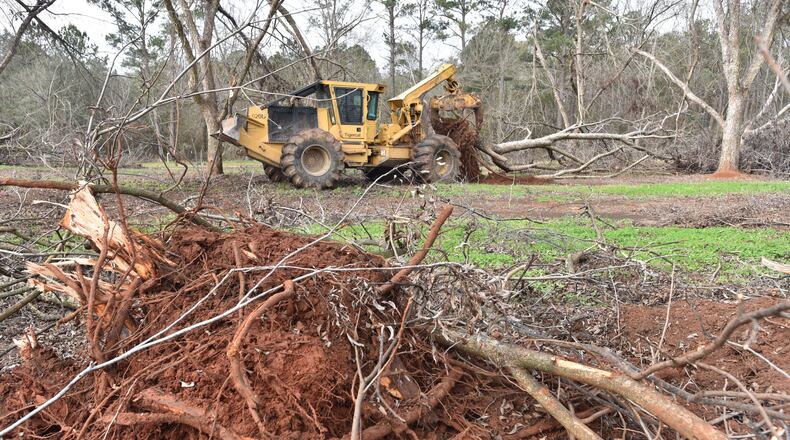South Georgia lawmakers whose districts were battered by Hurricane Michael are seething after congressional negotiators unveiled a compromise spending agreement on Thursday without any emergency money for recovery efforts.
As the border security package was being negotiated over the last three weeks, the state's lawmakers had been under the impression that it would include billions to help victims of 2018 natural disasters. So anger bubbled over after it became clear the disaster money had been omitted.
“To say I’m frustrated is an understatement,” said U.S. Rep. Austin Scott, R-Tifton, whose agriculture-heavy congressional district in south-central Georgia was walloped by the historic Oct. 10 storm.
Securing federal disaster recovery dollars has been a top priority for the Georgia delegation since Michael pummeled the southern portion of the state.
The Federal Emergency Management Agency had enough money in its coffers to take care of immediate clean-up needs, but lawmakers say billions more are needed to help the Georgia's farmers settle debts from the 2018 planting season and secure loans for 2019. One estimate from the University of Georgia said the agriculture sector suffered a more than $2.5 billion direct hit.
Working with colleagues from states that had been hit by other natural disasters, local lawmakers pushed to attach emergency money to must-pass legislation in the waning days of 2018. But the shutdown showdown over the president's border wall sucked up the political oxygen on Capitol Hill and stalled all other bills.
Georgia members said they had repeatedly received assurances that emergency money would be attached to the final border spending deal as the two parties haggled over detention bed numbers and barrier mileage.
Fighting over money for Puerto Rico eventually tripped up all disaster recovery negotiations, according to three congressional aides who were not authorized to speak on the record. House Democrats were pushing hard for hundreds of millions of dollars for the island's food stamp program in the aftermath of Hurricane Maria, which the White House in January called "excessive and unnecessary."
Negotiators ultimately decided to punt on the disaster money fight in order to avoid another politically damaging shutdown, since the border compromise also includes money to keep roughly one-quarter of the government open through September.
“I wish that it had been accomplished in December ... when we first got back in January ... last week. But it was out of my hands," said U.S. Rep. Sanford Bishop, D-Albany, who with Scott had led the delegation's push for the Michael money as a senior member of the House Appropriations Committee.
Others griped about bottlenecks in the Senate and regional rivalries on Capitol Hill that they thought disadvantaged southern states.
“I believe had this been California or New York the disaster money would have come out already,” said U.S. Rep. Rob Woodall, R-Lawrenceville.
Several lawmakers on Wednesday acknowledged it was likely too late to add the money to the border package, which both chambers of Congress are expected to clear on Thursday. But the Georgia Bankers Association launched an eleventh-hour effort with the Georgia Farm Bureau to pressure lawmakers to add it to the bill.
“There will be few opportunities in the future to secure these much-needed resources,” the trade group said in an email to members late Wednesday that directed them to sign a petition.
That same day, a bipartisan group of senators that included Georgia’s Johnny Isakson and David Perdue launched a new push for party leaders to advance a separate disaster recovery bill in the weeks ahead.
"Both sides of the Capitol must work together with the administration to come to a solution that addresses the needs of our home states, which have been forced to shoulder the burden of recovery efforts without the necessary assets," a group 13 senators wrote to House and Senate leaders. "Unfortunately, Congress has delayed providing this aid for too long while our communities face the consequences of our inaction."
With the Washington funding fight poised to continue, the Georgia Legislature has stepped up its own efforts to help local farmers. The state House voted for a mid-year budget last week that included $10 million in additional loan money for agri-businesses rebuilding after Hurricane Michael. That's in addition to a $470 million aid package the General Assembly passed in November.
State Rep. Tom McCall, R-Elberton, collected signatures from legislators on Thursday to send to the state’s congressional delegation.
“The federal government is moving at their normal blistering speed of a gopher tortoise, and we are trying to encourage them to hurry up and do their part in helping southwestern Georgia,” said McCall from the well of the Georgia House of Representatives.
He said Congress should behave like state legislators.
“Do what we do and talk to each other solve problems,” he urged Congress.
Staff writer Mark Niesse contributed to this article.
Read more:
About the Author
Keep Reading
The Latest
Featured


